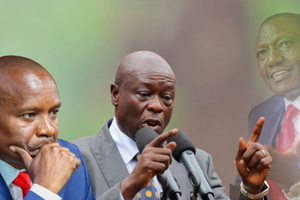
Politicking for wealth is therefore our biggest enemy as a country due to its contribution to corruption.
The recent vetting of Cabinet secretaries showed us the divide between the politicians and the voters. The amount of wealth the CSs accumulated over the short years in service showed the gaping divide between the voters and politicians, as majority of those who recorded the highest amounts are career politicians.
The question on the lips of many Kenyans, including mine and those on social media, is quite justified. Why would a very wealthy person ever want to bother to become a politician and work for the government for a pittance when they make billions? The story is the same in many other countries, too, as the former UK Prime Minister, Rishi Sunak was considered one of the richest men in the country if not the world given the money in the hands of his family.
Only two things perhaps inspire wealthy people to go into politics. Firstly, it could be egotism and power and secondly, it could be greed. Being in politics has become the easiest and shortest route to wealth it seems. An already wealthy person in Kenya seeking a seat in Parliament or Cabinet has no other intention, but to use the office to increase their wealth.
The positions give them access to lucrative government tenders. The term fast-track ‘VIP’ contracts coined in the UK during the Covid pandemic describes the phenomenon in most political systems in the world. Kenya is no exception.
Political violence
The days of politicians going into politics to serve the voters is a thing of the past. The fast-track ‘VIP’ tenders in places like Kenya tend to be fraught with political violence and even murders. A wealthy political aspirant in Kenya is prepared to gamble the wealth at hand to secure a political seat because (s)he knows they can get back a thousand times more through corruption and tenders.
The instability in most of the counties in the country is not caused by representatives fighting for voters’ rights, but to get close to the exchequer. Nowhere is experiencing such upheavals than Meru County right now. The problem having been started by unauthorised expenditures by the governor for herself and her family among other cases of abuse of power. Despite this, the court decided to relinquish its role of interpreting constitutional law to the village elders on the impeachment of the said governor.
I am not suggesting that wealthy people cannot serve the public, but the issue is whether they can connect with the voters. They cannot for the simple fact that the intention of the politician and the voters are parallel as they both want different things from politics. The voters hope for better public service, but the politician, in places like Kenya, is focused on the accumulation of wealth on top of the huge wealth they already have. Public service is wanting mainly in Kenya because a wealthy politician is rarely able to walk in the shoes of poor voters because they never came to serve in the first place.
The country’s desire to have apolitical technocrats as Cabinet secretaries has slowly been whittled down. The purpose of having technocrats as CSs was to take politics out of service delivery and give it to professionals. However, the Kenyan government is just not able to thrive without politicians in the Cabinet. Hence, the constitutional regression. This is because politicians are more useful to the government of the day than they are to the voters. A political CS is good at carrying on campaigning back-to-back than focus on development. Hence the reason why politicians never seem to come down from the roof-tops of their cars from one election to the next as they were not nominated to help the voters, but to maintain power for the government. They may have been voted and nominated into office, but that does not mean they are under any obligation politically to stay in the office and work. Theirs is to campaign and keep the political fire burning.
Career politicians
The danger of having career politicians in the Cabinet, especially in countries like Kenya is anathema to development. They do not understand or are made to not understand that their role is first and foremost to put their bums on the seat and work, but instead they are out and about shouting for five years in never ending political rallies.
Money has been the front and centre of politics in Kenya. Be that through fast-track tenders for politicians or alleged bribes in Parliament. Saying Kenyan politicians are in it for the money is an understatement. Expecting them to be principled is expecting the proverbial pig to fly. It is not surprising therefore for the ‘NO’ MPs who voted against the Finance Bill, 2024, to sycophantically ask for forgiveness from the President rather than uphold their pride for standing up for their voters’ hardship and rights.
Politicking for wealth is therefore our biggest enemy as a country due to its contribution to corruption. Therefore, to end State capture and plunder, accountability and good governance are worth fighting for.
Ms Guyo is a legal researcher, [email protected], @kdiguyo










